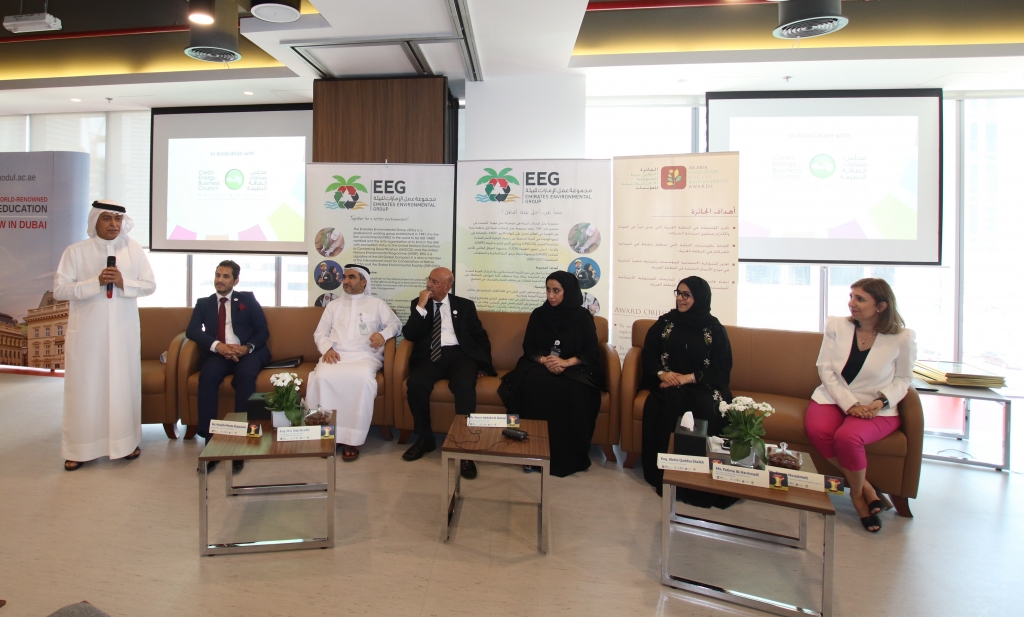
Emirates Environmental Group hosts 3rd of its series of Panel Discussions for the Year 2018
The Emirates Environmental Group (EEG) organised a Panel Discussion on the topic of “Zero Waste: Food for Thought?”, held on the 27thof June at the Modul University, Dubai. The event was conducted in association with the Arabia CSR Network, Emirates Green Building Council, Clean Energy Business Council and with strategic support from the United Nations Environment Programme (UNEP).
Reflecting on the virtues of the Holy month of Ramadan, the meaningful panel discussion addressed the importance of sustainable sourcing, production and consumption of food. The event welcomed food expert panelists, who shared unique best practices and challenges within wide-ranging disciplines in promoting sustainability along the food value chain, from farm to fork. As a partner of the 10YFP Sustainable Food Systems Programme of UNEP, EEG hosted the impactful discussion to strengthen the information platform on sustainable food systems for the open conversation and knowledge sharing amongst producers, consumers and other key stakeholders linked to the food industry.
“It is imperative for EEG, as a civil society organisation to facilitate the connection between the food and agriculture sector with science, media and education”, said Mrs. Habiba Mara’ashi, Chairperson of the EEG and President and CEO of Arabia CSR Network. She continued, “Our organisation encourages and supports inclusive multi-stakeholder dialogue to help inform interconnected policy-making towards sustainable food systems at local, regional and international levels”.
For the first time in the UAE, the critical topic of sustainable production and consumption of food was strategically covered in full scope, bringing together a diverse panel of speakers, representing government, waste management, hospitality, supermarket retail, and food catering.
Mr. Abdul Aziz Al Midfa, Vice Chair of EEG, moderated the discussion wherein significant questions were raised, such as how overconsumption of food is being tackled through innovative strategies? How have food awareness initiatives influenced the existing policies and regulations? And how have the local entities in the food sector ensured that their food is locally and seasonally sourced?
Eng. Naji Radhi, Waste Management and Treatment Expert in Dubai Municipality, emphasised on priority activities and challenges in the reduction of food loss andorganic waste, facing the planet. The global estimated cost of discarding food waste annually has reached a staggering AED1.5 trillion. Representing the government sector, Eng. Radhi called for decision-makers globally to raise awareness on the lack of landfill space and financial implications of high tipping fees from waste disposal and urged for more support from commercial establishments and corporate entities in source segregation.
Ms. Noura Al Shamsi, Head of Permits and Applied Nutrition Section, Food Safety Department in Dubai Municipality, highlighted on the role of the UAE in achieving the global Sustainable Development Goal 2, which aims to achieve food security, improve nutrition and promote sustainable agriculture. She raised awareness about the UAE Food Bank initiative, which was established in 2017, under the umbrella of the Mohammed bin Rashid Al Maktoum Global Initiatives. Addressing the nexus between philanthropy and food waste minimisation, the first of its kind Food Bank in the country, aims to create a comprehensive ecosystem, which efficiently stores, packages and distributes excess fresh food from hotels, restaurants and supermarkets to those in need.
Drawing attention on the implications of irresponsible food consumption practices and the unique social and cultural food habits that exist in every household, Ms. Fatima Ahmad Al Harmoudi, Senior Public Awareness Officer at the Centre of Waste Management – Abu Dhabi (Tadweer) shared the awareness campaigns conducted by the Centre to educate the youth on the existing pressure on food resources and change the well-established habits that elevate the irresponsible consumption of food. Lack of knowledge on the critical issue leads to food loss at every stage of the food supply chain: production, processing, retailing and consumption, causing significant economic losses, as production continues to grow, while the scarce food resources decline.
Expert panelists from the supermarket retail, hospitality and catering services, Mr. Huzefa Rupawala, Regional Manager ofLulu Group International, Eng. Abdul Quddus Sheikh, Director of Engineering, Armani Hotel Dubai, and Ms. Nancy Nouaimeh – Quality, Safety and Performance, Abela & Co, shared their best practices in line with the promotion of sustainable food systems. Amongst the solutions discussed, was the importance of transparent and reliable communication of food product information throughout the supply chain, implementation of compost technologies, use of local grown products and the need for capacity development and awareness sessions for the employees.
The attendees comprised of government and private sector representatives, supermarket retailers, hospitality, academia and waste management companies across the UAE. The successful event provided a valuable networking opportunity to leverage the local knowledge and resources towards the mutual goal of promoting, enhancing and facilitating the global shift towards more sustainable food systems.



























